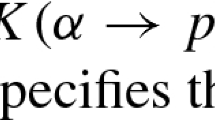Abstract
The Fitch paradox poses a serious challenge for anti-realism. This paper investigates the option for an anti-realist to answer the challenge by restricting the knowability principle. Based on a critical discussion of Dummett’s and Tennant’s suggestions for a restriction desiderata for a principled solution are developed. In the second part of the paper a different restriction is proposed. The proposal uses the notion of uniform formulas and diagnoses the problem arising in the case of Moore sentences in the different status propositional letters receive. The new proposal is able to avoid some of the criticism on its predecessors.
Similar content being viewed by others
References
Beall J. C. (2000) Fitch’s proof, verificationism, and the knower paradox. Australasian Journal of Philosophy 78: 241–247
Blackburn P., de Rijke M., Venema Y. (2001) Modal logic. Cambridge University Press, Cambridge
Brogaard B., Salerno J. (2002) Clues to the paradoxes of knowability: Reply to Dummett and Tennant. Analysis 62: 143–150
Chihara C. S. (1979) The semantic paradoxes: A diagnostic investigation. Philosophical Review 88: 590–618
DeVidi D., Kenyon T. (2003) Analogues of knowability. Australasian Journal of Philosophy 81: 481–495
Douven I. (2005) A principled solution to Fitch’s paradox. Erkenntnis 62: 47–69
Dummett M. (2001) Victor’s error. Analysis 61: 1–2
Edgington D. (1985) The paradox of knowability. Mind 94: 557–568
Égré P. (2005) The knower paradox in the light of provability interpretations of modal logic. Journal of Logic, Language and Information 14: 13–48
Fitch F. B. (1963) A logical analysis of some value concepts. The Journal of Symbolic Logic 28: 135–142
Halbach V. (2008) On a side effect of solving Fitch’s paradox by typing knowledge. Analysis 68: 114–120
Hand M. (2003) Knowability and epistemic truth. Australasian Journal of Philosophy 81: 216–228
Hand M., Kvanvig J. (1999) Tennant on knowability. Australasian Journal of Philosophy 77: 422–428
Horsten L. et al (2010) On a necessary use of truth in epistemology. In: Czarnecki T. (ed.) The Analytical Way. Proceedings of the 6th European Congress of Analytic Philosophy. College Publications, London
Kaplan D., Montague R. (1960) A paradox regained. Notre Dame Journal of Formal Logic 1: 79–90
Kvanvig J. L. (2009) Restriction strategies for knowability: Some lessons in false hope. In: Salerno J. (ed.) New essays on the knowability paradox. Oxford University Press, Oxford, pp 205–222
Leitgeb H. et al (2006) Towards a logic of type-free modality and truth. In: Dimitracopoulos C. (ed.) Logic Colloquium 05. Lecture Notes in Logic. Cambridge University Press, Cambridge, pp 68–84
Linsky B. (2009) Logical Types in some arguments about knowability and belief. In: Salerno J. (ed.) New essays on the knowability paradox. Oxford University Press, Oxford, pp 163–179
Paseau A. (2008) Fitch’s argument and typing knowledge. Notre Dame Journal of Formal Logic 49: 153–176
Restall G. (2009) Not every truth can be known (at least, not all at once). In: Salerno J. (ed.) New essays on the knowability paradox. Oxford University Press, Oxford, pp 339–354
Tennant N. (1997) The taming of the true. Oxford University Press, Oxford
Tennant N. (2001) Is every truth knowable? Reply to Hand and Kvanvig. Australasian Journal of Philosophy 79: 107–113
Tennant N. (2002) Victor vanquished. Analysis 62: 135–142
Tennant N. (2009) Revamping the restriction strategy. In: Salerno J. (ed.) New essays on the knowability paradox. Oxford University Press, Oxford, pp 223–238
van Benthem J. (2004) What one may come to know. Analysis 64: 95–105
van Benthem J. (2009) Actions that make us know. In: Salerno J. (ed.) New essays on the knowability paradox. Oxford University Press, Oxford, pp 147–162
Williamson T. (2009) Tennant’s troubles. In: Salerno J. (ed.) New essays on the knowability paradox. Oxford University Press, Oxford, pp 183–204
Wright C. (2000) Truth as sort of epistemic: Putnam’s peregrinations. The Journal of Philosophy 97: 335–364
Author information
Authors and Affiliations
Corresponding author
Rights and permissions
About this article
Cite this article
Fischer, M. Some remarks on restricting the knowability principle. Synthese 190, 63–88 (2013). https://doi.org/10.1007/s11229-010-9833-0
Received:
Accepted:
Published:
Issue Date:
DOI: https://doi.org/10.1007/s11229-010-9833-0



